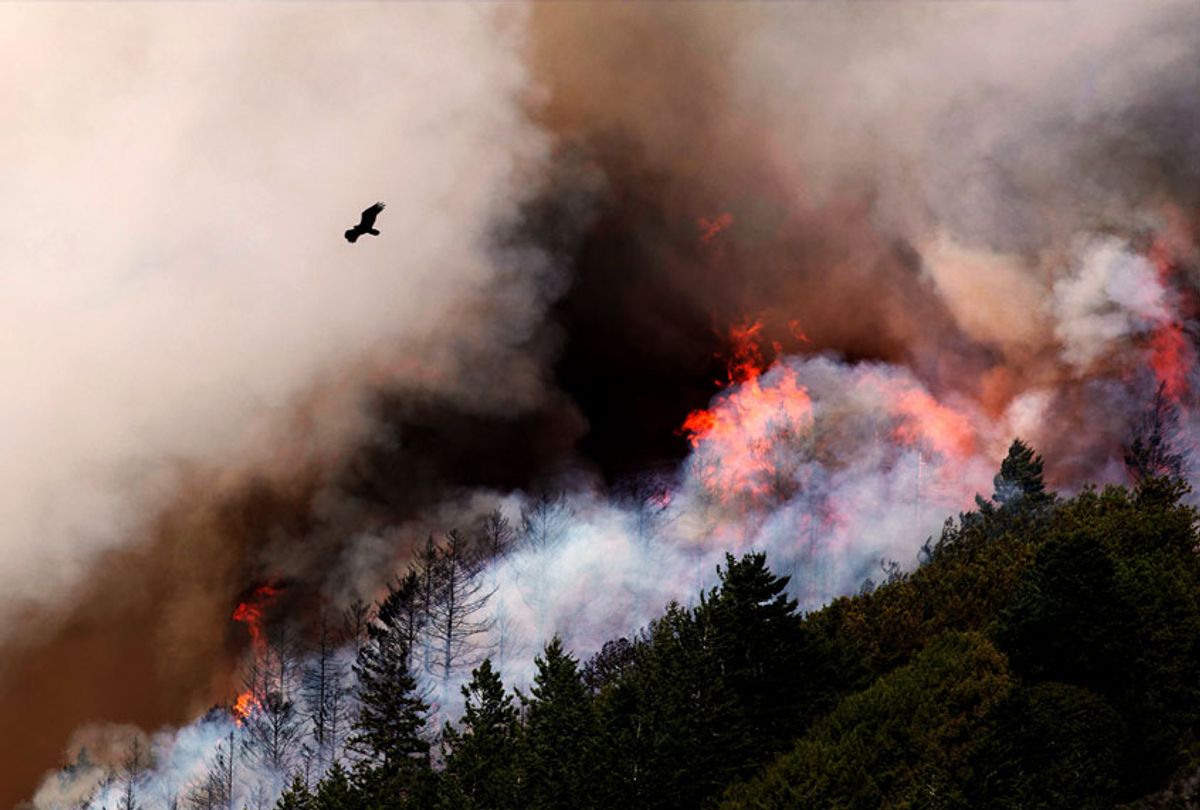California is being ravaged simultaneously by two natural disasters, the coronavirus pandemic and the ongoing wildfires. Worse, the two compound each other: toxic wildfire smoke cloaking the coastal major cities will, doctors fear, worsen the outlook for COVID-19 patients.
Amid a heatwave and strange series of thunderstorms, which some suspect might be the new normal thanks to climate change, a mix of lightning strikes and dry heat have lit the state on fire. There are currently, as of Friday afternoon, 560 wildfires burning across the state causing mass evacuations. In Northern California, two prominent growing groups of fires, the S.C.U. Lightning Complex and L.N.U. Lightning Complex, both rank in the top 10 largest fires in recent state history.
Indeed, the wildfire-coronavirus combination is a peak apocalypse moment for California, and doctors fear there will be no break in the coming months as wildfire smoke is expected to worsen coronavirus symptoms and transmission.
"I'm exhausted, more than anything," Jahan Fahimi, an emergency care physician practicing at University of California San Francisco (UCSF) Health, said a press conference on Thursday. Fahimi said UCSF hasn't seen an uptick in hospitalizations due to wildfire smoke yet, but he does fear what will happen when kids return to school and how the wildfire season persists. "We're in this perfect storm of a lot of uncertainty with not a ton of reassurance that things are going to get substantially better in the next few months."
Brent Andrew, Chief Communications Officer at Zuckerberg San Francisco General Hospital, told Salon they haven't seen a rise in hospitalizations yet, but are prepared to deal with both crises at the moment.
"We have not seen a significant rise in respiratory complaints to this point," Andrew said. "There is a steady stream, but not a significant rise."
This week, the Bay Area has the worst air quality recorded in the world.
What is happening in Northern California right now is not unprecedented. At the beginning of the pandemic, scientists and health experts predicted that wildfires might indirectly increase the likelihood of the coronavirus spreading — in part by displacing Californians, thus making it more difficult to socially isolate. In Santa Cruz, where mass evacuations recently took place, some displaced residents are opting to sleep in their cars instead of evacuation centers for fear of getting COVID-19, according to the New York Times.
"Wildfires are requesting people to relocate given their homes are in danger, and suddenly you're taking people who have been quarantined and asking them to find a new place to live," Panagis Galiatsatos, an assistant professor at Johns Hopkins School of Medicine who is a pulmonary physician and media spokesperson for the American Lung Association, previously told Salon. "Now they're expanding their social bubble out of necessity without the appropriateness of really thorough contact tracing to understand where these family members have been, and so forth."
And then there's the toxicity of the wildfire smoke itself.
"What we know about air pollution in general, and particulate matter specifically, and respiratory health is that the fine particles (PM2.5) make a damage in the deep lung," John Balmes, MD, UCSF professor of medicine in the divisions of occupational and environmental medicine and pulmonary and critical care, said at a Thursday press conference.
Balmes said if someone with asthma inhales wildfire smoke they're at an increased risk of "exacerbation of asthma."
Balmes added: "The immune response is altered by air pollution exposure."
This isn't good when there's an uncontrolled respiratory virus.
"We're very worried about this combination of wildfire season, wildfire smoke exposure and a raging viral pandemic," Balmes said.
As Salon has reported, the long-term effects of wildfire exposure are unknown. Researchers point to one study in which researchers observed pregnant women residing in California's South Coast Air Basin from 2001 to 2005. In October 2003, wildfires exposed people in Southern California to elevated levels of air pollution over several weeks. The study's authors found a slightly lower birth weight in women who were pregnant during the wildfires.
In the more immediate future, exposure to wildfire smoke can exacerbate cardiovascular disease, and increase the risk of heart attacks and strokes, according to research.
As for now, medical experts are advising people in affected areas to shelter-in-place yet again, as long as their homes aren't threatened by the wildfires, to stay safe from the coronavirus and the wildfire smoke.
Meanwhile, many Californians are glum about the future.
"The fact that we are in the middle of a big heatwave and the wildfire smoke — that kind of convergence is going to happen again and again, and that's what I'm worried about," Balmes said. "What kind of future are we leaving for our young people?"



Shares